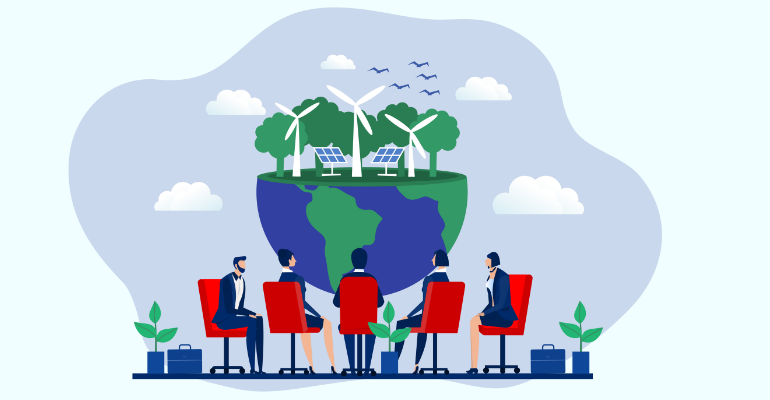Policy Brief
Thematic Area: Sustainability and Energy Transition

A Look at the Issue Note of Energy Transitions Working Group of G20 South Africa
G20 and B20 Action on Energy Transition
Since 2013, the G20 has focused on energy sustainability for economic resilience and environmental sustainability. Under the Sherpa Track, G20 South Africa has established the Energy Transitions Working Group which builds on the work of past G20 presidencies with a special focus on energy transition in Africa.
Under Indonesia’s G20 Presidency, the country set the target of net zero emissions by 2050 and committed a USD 20 billion agreement to decarbonize its economy as well as USD 122 billion for renewable energy projects. India’s G20 Presidency saw a wide agenda on climate change, sustainability, energy security and equitable energy access. India also launched the Global Biofuels Alliance as a model for boosting renewable energy through biofuel sources. Similarly, Brazil as G20 President launched the Global Alliance against Hunger and Poverty and led adoption of Principles for Just and Inclusive Energy Transitions and progress of Climate Finance Initiatives.
B20 as the business engagement group of G20 aligns with the long-term sustainability and energy transition priority. Consecutive presidencies have set up task forces on this issue to develop business-friendly approaches to policymaking towards sustainability. For B20 Indonesia, green transition was one of top three priorities and it introduced a legacy program on Carbon Centre of Excellence. Likewise, B20 India proposed a Global SDG Acceleration Fund for mobilizing finance for climate resilience in the Global South. B20 Brazil introduced climate action legacies such as the B20 Climate Hub and the Carbon Centre of Excellence.
A Task Force on Energy Mix and Just Transition has been established by B20 South Africa to ‘develop bold, actionable policy recommendations that accelerate the adoption of renewable energy, strengthen energy security, foster innovation in green technologies, and support global climate resilience efforts.’
G20 South Africa: Issue Note of Energy Transitions Working Group
Noting that access to electricity eludes almost 750 million people, a majority of whom are in sub-Saharan Africa, and that developing nations remain dependent on natural resources and ageing energy infrastructure, the issue note prioritises aligning with the African Union’s Agenda 2063 and Africa Climate Summit’s Nairobi Declaration which target industrial growth, clean energy investments and just transitions. Regional energy interconnectivity is a cornerstone of Africa’s energy security and global energy cooperation. A key challenge is financing for clean energy where financial models typically depend heavily on debt-based instruments. Accordingly, the note outlines three key priorities for G20 South Africa.
Priority 1: Energy Security, Affordable and Reliable Access
Data on access to electricity and clean cooking fuels, particularly in Africa, is troubling, and there is need to ensure security and affordability along with access, in line with national capabilities and priorities. Towards this, G20 South Africa aims to i. develop a framework for addressing energy security risks and diversification of energy sources, ii. draft a roadmap for financing access, particularly for Africa, by using technologies to reach underserved communities, iii. address gaps in clean cooking, iv. devise a G20 action plan for energy infrastructure upgradation, and v. create affordability frameworks.
It also aims to develop an Energy Efficiency Policy Toolkit based on global experiences and best practices. A Clean Cooking Infrastructure Investment Action Plan is also proposed for advancing financing and investment, policy development and partnerships between national and local governments and the private sector.
Priority 2: Just, Affordable and Inclusive Energy Transitions
Africa can benefit greatly from the global energy transition, given its high share in critical and other mineral resources, by building local clean energy supply chains and undertaking local value addition. The discussions at the Working Group would focus on developing an action plan for establishing green industrial frontier hubs in Africa, repurposing coal-dependent economies through pooled capacity, taking forward G20 Brazil’s principles, developing a roadmap for local content requirements, crafting an action plan for clean hydrogen for hard-to-abate sectors, and developing a roadmap for sustainable fuels.
A new G20 South Africa initiative for industries in transition will outline opportunities in beneficiation of critical minerals, beneficiation of heavy industry inputs, production of hydrogen and its derivatives, and clean technology manufacturing.
Priority 3: African Interconnectivity
With South Africa as the first African nation to lead the G20, it has placed an immense focus on Africa’s development. Even while Africa possesses vast energy resources, critical minerals and oil and gas, it remains energy poor, and its energy investment has fallen over recent years. Mission 300, led by the World Bank Group and the Africa Development Bank Group, aims to facilitate electricity access for 300 million Africans by 2030.
In alignment with this, South Africa will work towards mobilizing G20 support for public and private investments in Africa’s energy infrastructure, power pools, and energy markets. Grid interconnection will be central to this effort, as the Africa Single Electricity Market gets underway. Best practices on regional interconnectivity will be studied to develop an action plan for Africa and a ten-year infrastructure investment plan will be developed for at least three cross-border energy projects. South Africa would also work on policy harmonization for a combined energy market and establishing two renewable energy corridors by 2030.
Conclusion
With several discussion platforms proposed during G20 South Africa on this important pillar of G20 engagement, the South Africa presidency can foster global dialogue and set clear principles for action, which will position G20 as a leader in ensuring reliable, affordable, and sustainable energy security for the world and for Africa.
Addressing energy transitions holistically—linking access, equity, and security—South Africa aims to bridge the gap between developed and developing nations, fostering solidarity and sustainable progress toward global net-zero targets by 2050. Its presidency offers a platform to showcase Africa’s potential in renewable energy and advocate for financing mechanisms that support a just transition to a cleaner energy future, opening new opportunities for businesses of the G20 nations.
